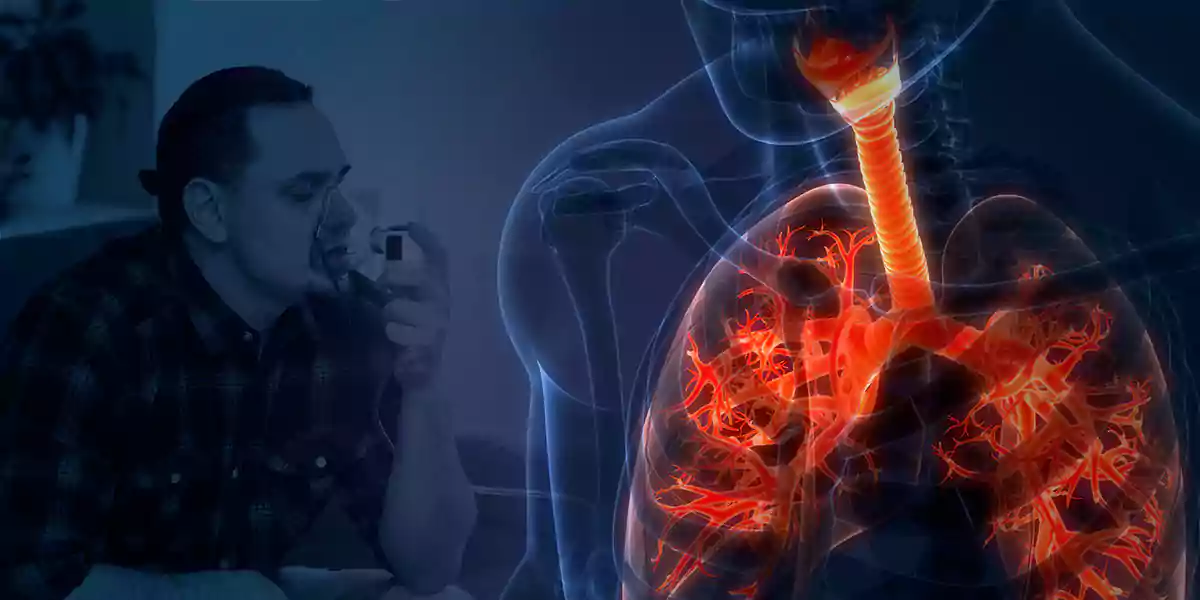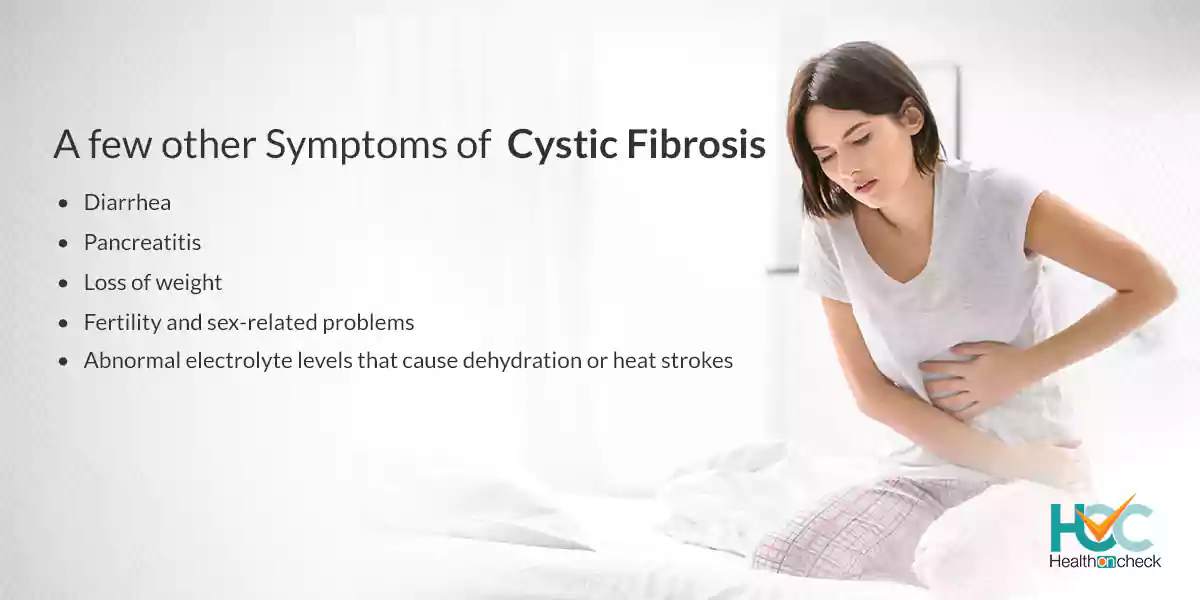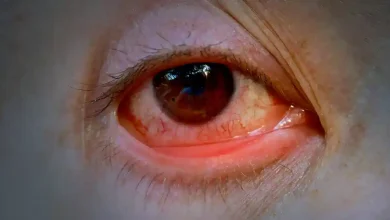All about Cystic Fibrosis

What is Cystic Fibrosis?
Cystic fibrosis (CF) is a genetic disorder where there is severe damage to the lungs, digestive system, and other organs of the body. Cystic fibrosis attacks the cells that produce mucus, digestive juices, and sweat. These fluids are usually thin and slippery but for people who are suffering from CF, these fluids become thick and sticky because of an inherited defective gene. In this condition the secreted fluid plug up tubes, ducts, and passageways, particularly in the lungs and pancreas which gives rise to various health-related problems.
What are the Types of Cystic Fibrosis?
Cystic fibrosis is a genetic disease caused by a mutation in a single gene. Scientists have divided this mutation into five classes which are as follows:
- Protein Production Mutations (Class 1)
- Protein Processing Mutations (Class 2)
- Gating mutations (Class 3)
- Conduction mutations (Class 4)
- Insufficient protein mutations (Class 5)
What are the Symptoms of Cystic Fibrosis?
The symptoms of cystic fibrosis vary based on the severity of the disease. Since cystic fibrosis is a genetic disorder; people who are suffering from it are born with this condition. In many countries, newborn screening is conducted which can diagnose cystic fibrosis within the first month of a baby. Symptoms also vary according to the age of the patient which are as follows.
Symptoms of cystic fibrosis in children:

- Inability to gain weight even after a good appetite and intake of foods with a good amount of calories.
- Trouble with bowel movements or loose and greasy stools
- Difficulty in breathing
- Frequent infections in the lungs along with recurrent bronchitis or pneumonia
- Constant wheezing
- Sinus infections that keep on appearing at regular intervals
- Cough
- The slow growth of the body
In people with atypical cystic fibrosis, symptoms may not occur till one reaches adulthood. Signs and symptoms in such instances are:
- Persisting Sinusitis
- Problems while breathing
- Recurring pneumonia
- Nasal Polyps
A few other symptoms of cystic fibrosis are:

- Abnormal electrolyte levels that cause dehydration or heat strokes
- Fertility and sex-related problems
- Diarrhea
- Pancreatitis
- Loss of weight
What are the Causes of Cystic Fibrosis?
Cystic fibrosis is a genetic disorder that is something not in the hands of the patients who are diagnosed with it. The patient inherits the mutated copy of the gene from both of your parents that mutates a protein responsible for the movement of salt in the cells of the body. The result is thick, sticky mucus in the respiratory, digestive, and reproductive systems, along with increased salt in sweat.
One important aspect of cystic fibrosis is that it’s not necessary that the parents of someone diagnosed with cystic fibrosis also have cystic fibrosis. One has to inherit one copy of the gene from each parent, to have cystic fibrosis. Many times, people inherit only one copy, because of which cystic fibrosis can’t occur but such people become carriers and pass the gene to their children which causes cystic fibrosis.
What are the Risk Factors Associated with Cystic Fibrosis?
The biggest risk factor for cystic fibrosis is a family history of the disease, specifically if one of the parents is a known carrier. The gene responsible for cystic fibrosis is recessive that means to get cystic fibrosis; children have to inherit two copies of the gene, one from each parent.
The gene responsible for cystic fibrosis is most common among Caucasian people of northern European descent. The disease occurs most commonly in these people, but it’s not limited to them only and people from any race can have cystic fibrosis.
How is Cystic Fibrosis Diagnosed?
In most of cases, cystic fibrosis is diagnosed during childhood only. Cystic fibrosis can be diagnosed with a thorough evaluation and various types of tests that include:
- Newborn Screening: If the newborn child has a family history of cystic fibrosis then the doctor prescribes newborn screening to diagnose the condition. A few droplets of blood are taken from the baby and sent for a blood test that diagnoses cystic fibrosis.
- Sweat: Cystic fibrosis increases the amount of salt in the sweat and many times parents can check it by testing the sweat of the baby by keeping a drop or two of it in their tongues to check whether it’s saltier than the sweat of normal people. Medically doctors use a particular chemical to check the amount of salt in the sweat. People of any age can opt for a sweat test to diagnose cystic fibrosis and one good thing about this test is that it’s not painful because there is no need for needles and it is also considered the most decisive test for diagnosing cystic fibrosis.
- Genetic Tests: Blood samples are taken for testing the genes responsible for cystic fibrosis.
- Chest X-rays: X-rays of the chest are used to diagnose cystic fibrosis. Other tests must be done along with it to make sure that the patient has cystic fibrosis.
- Lung Function Tests: A device called a spirometer is used in this test to diagnose cystic fibrosis.
Apart from the above-mentioned tests, some other tests like sputum culture, nasal potential difference (NPD), and Intestinal current measurement (ICM) are useful to diagnose cystic fibrosis.
What Are The Treatment Options For Cystic Fibrosis?
There is no cure for this genetic disorder but there are some treatments available that can ease the symptoms and keep it in control to make sure it’s not very severe.
Medications
There’s no cure for cystic fibrosis, but medications and other therapies can ease symptoms.
Your doctor may prescribe a few medicines to clear your airways, thin mucus, avert infections, and help your body to get nutrients from food. Some common medications are:
- Antibiotics. Antibiotics are prescribed to treat and prevent lung infections allowing your lungs to function properly. They are mostly available as pills, in an inhaler, or a shot.
- Anti-inflammatory medicines. Medicines such as ibuprofen and corticosteroids are prescribed to stop inflammation.
- Bronchodilators. It’s used in an inhaler and it helps to relax and open your airways.
- Mucus thinners. Mucus thinners help in keeping the muck out of your airways. It’s used in an inhaler.
- CFTR Modulators. It helps the lungs to function properly along with helping you to gain weight.
- Combination therapy. It targets the CFTR protein and makes it work more competently.
Airway Clearance Techniques
Your doctor may teach you some techniques to clear the airways and get rid of the mucus
- Chest therapy or percussion: Your doctor may teach you some techniques to clear the airways and get rid of mucus. It involves tapping or clapping on your chest or back to clear mucus from your lungs.
- Oscillating Devices: Here you need to breathe into a special device that oscillates, or vibrates, your airways leading to the loosening of mucus and making it for you to cough.
- Surgery: Though not very common, sometimes surgery is carried out to ease the symptoms of cystic fibrosis along with curing the sinus. Bowel surgery is done to remove blockages or surgery is also carried out for liver transplant in very rare instances.
What are the Complications of Cystic Fibrosis?
Though cystic fibrosis mostly causes problems in the lungs but the lung is not the only organ it can affect. It may also affect other organs of your body like the pancreas, liver, intestine, bladder, kidney, reproductive organs, etc.
Some complications of cystic fibrosis are as follows:
- Grown up people may face problems with breathing, digestion, and their reproductive organs.
- People with cystic fibrosis have thick mucus that can hold bacteria, which may lead to various types of bacterial and viral infections.
- The risk of developing diabetes is higher in people with cystic fibrosis. Also, the risk of bone-thinning issues like osteopenia and osteoporosis increases if you have cystic fibrosis.
- It can affect the fertility of both men and women which means that they are not able to become pregnant. In such instances, alternative reproductive technologies can be used to become pregnant. If a woman is pregnant even with cystic fibrosis, problems may arise during the period of pregnancy and delivery.
Living with Cystic Fibrosis
Since cystic fibrosis is a genetic disease, symptoms start to pop up during childhood only. There is no cure for it but with proper guidance and the usage of new technologies, people with cystic fibrosis can lead a healthy and normal life without many complications. There are various medications and other technologies available to curb infections and help in gaining weight and energy from food. In the earlier days, it was considered to be a fatal disease because most of the children with cystic fibrosis used to die early but with advances in the medical world, many with cystic fibrosis can live longer life. People with atypical cystic fibrosis have higher chances of living than the ones suffering from classic cystic fibrosis.
Whom to Consult?
If you are having problems such as infection, feeling tired easily, or not able to gain weight because of cystic fibrosis then you shall visit a doctor. After listening to you, he may check you and ask you to go for some tests after which the doctor may prescribe you a few medicines or techniques to get rid of such problems.




